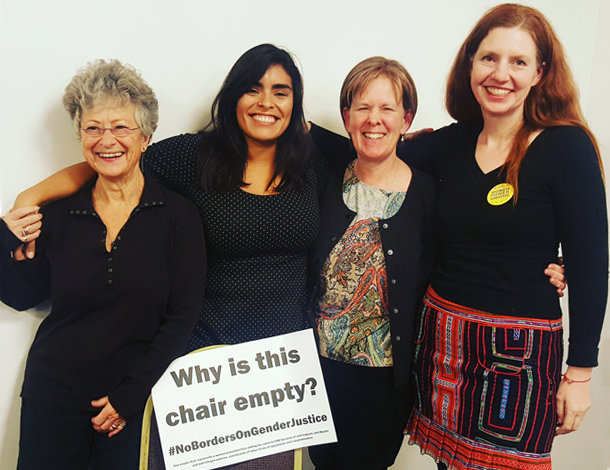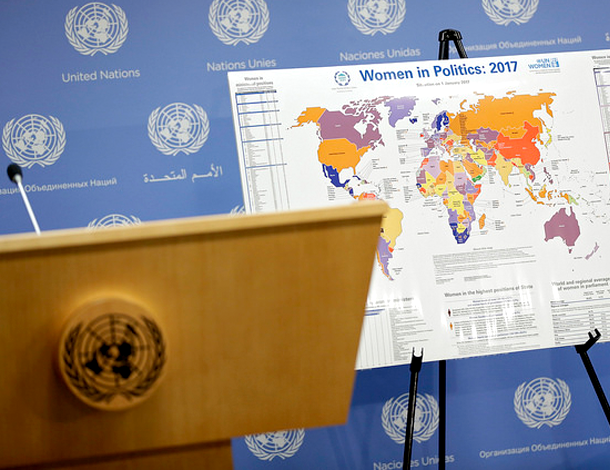An opportunity of this scale comes around once a year for feminists and women’s rights activists
Every year since 1947, government officials, NGO representatives and activists, have travelled to the United Nations headquarters in New York for the Commission on the Status of Women (CSW), a multilateral space dedicated to the promotion of gender equality and women’s rights. Some of the attendees wield policy recommendations, and others, lists of grievances on their country’s track record of violations against women’s rights, all hoping to have an impact on international women’s rights policies, and to hold their governments accountable on existing commitments made to promote and enshrine women’s rights .
But the 61st session was marred by the spectre of travel bans
The restrictions even spurred doubts from a number of human rights organizations about the legitimacy of the US as a venue for events such as CSW.
Organisations like the Women’s International League for Peace and Freedom declined to participate in this year’s proceedings stating that “... the absence of women from countries affected by the recent US travel ban undermines the basic premise of the CSW as being an inclusive and participatory process and threatens its legitimacy.”

Other feminist and human rights institutions called for accountability from the CSW host country. A coalition of organisations including MADRE, Just Associates, OUTRIGHT Action International, Women In Migration Network, Centre for Women’s Global Leadership and the Association for Women’s Rights in Development launched a ‘No Borders on Gender Justice’ campaign at CSW calling for an ‘end to policies of authoritarianism and xenophobia’, and in their events highlighted the absence of targeted women’s rights activists from the space by symbolically setting out an empty seat with a sign saying, ‘Why is this chair empty?’.
It's not just activists from the countries listed in the Trump Administration’s Executive Order that were unable to travel to CSW.
Kate Lappin, Regional Coordinator of the Asia Pacific Forum on Women, Law and Development (APWLD) shared that five grassroots activists from Bangladesh and Nepal registered as part of their delegation for CSW were denied visas in spite of official UN Women invitations, and APWLD’s own assurances to cover travel costs, and offer guarantees. The organisation appealed the visa denials unsuccessfully, which in itself was unusual as on previous occasions, APWLD had been successful upon appeal in having visa denials overturned, and this was the first time the organisation had been unable to have members of their delegation attend an event to which they had official UN invitations. Instead they were informed by the US embassy that ‘they will be issuing less visas in general from Bangladesh and Nepal’.
How travel bans impact women’s rights activists and defenders
As Lappin pointed out, travel bans “ target countries and women who already have less power in their countries.”
Elite women who are well connected in governments, or have significant resources or existing visas could travel to CSW. The women who were unable to attend CSW were grassroots activists. In the case of the five members of the APLWD delegation, these were activist leaders working in the informal sector, which is the part of the labour force which is most marginalised and arguably needed to contribute the most to the CSW61 theme of ‘Women’s economic empowerment in the changing world of work’.

The U.S.A.’s travel ban places the country squarely in the company of countries like Bahrain, Sudan, Turkey and Egypt that have increasingly issued travel bans against women’s rights activists and human rights defenders.
At this year’s CSW, Nazra for Feminist Studies, a leading Egyptian human rights organisation co-organised in absentia a parallel event on ‘The role of Women Human Rights Defenders (WHRDs) in the MENA Region, and its intersection with the Sustainable Development Goals (SDGs)’. Mozn Hassan, the award winning Executive Director of Nazra participated in the event via video because she has been banned from traveling by the Egyptian state, and was unable to attend CSW. Maryam Al Khawaja, a Bahraini women’s human rights defender who also spoke at the event pointed out that activists were now being targeted in new and pernicious ways by States in the Middle East and North Africa. She described the new threats faced by activists in the region as being increasingly personal, and on the surface not the type that is usually recognised as significantly repressive by international bodies. Examples cited included the the freezing of personal assets, and the denial of basic citizenship rights such as not issuing a birth certificate to the child of an activist.
At a session organised by MADRE on the sidelines of CSW, activists including Kavitas Ramdas, Hakima Abbas, Cynthia Rothchild, Charo Rojas and Yifat Susskind spoke about the increasing global surge to the right, and the consequent negative impact on women’s rights.
Travel bans were identified as one strategy being deliberately used to prevent activists from meeting, working together, and being in spaces such as CSW to hold their governments accountable to commitments made to women’s rights. This makes it even more ironic that the Trump Administration’s Executive Order invokes the prevention of gender based violence, and women’s rights as rationale for the travel ban widely seen by activists as racist, xenophobic and contrary to the spirit of human rights.
